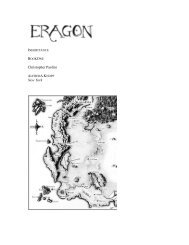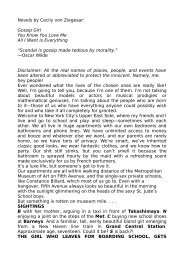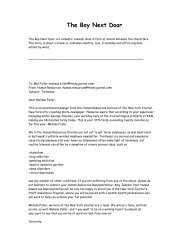- Page 1:
Tera Lynn Childs DUT TON CHILDREN
- Page 6 and 7:
DUTTON CHILDREN’S BOOKS A divisio
- Page 11 and 12:
CH A P TE R WHEN I’M RUNNING I ca
- Page 13 and 14:
“Congratulations, Phoebe,” he s
- Page 15 and 16:
excitement. “The wedding will be
- Page 17 and 18:
Mom gives me an of-course-not look.
- Page 19 and 20:
“I don’t know,” Nola says.
- Page 21 and 22:
just right—and it’s not like I
- Page 23 and 24:
line at LAX security was so long I
- Page 25 and 26:
many miles away, the lacy iron stru
- Page 27 and 28:
Then, with no consideration for my
- Page 29 and 30:
lissville and not even caring what
- Page 31 and 32:
think about it, I’m off the train
- Page 33 and 34:
in exhaustion and watching the wave
- Page 35 and 36:
guy who keeps his speech squeaky cl
- Page 37 and 38:
And while I might doubt her judgmen
- Page 39 and 40:
tie—my first clue that he’s a l
- Page 41 and 42:
around. “We descendants are more
- Page 43 and 44:
defines their world in terms of ‘
- Page 45 and 46:
I grab my backpack off the ground a
- Page 47 and 48:
Stella laughs at me and pops one in
- Page 49 and 50:
I don’t plan on eating anything t
- Page 51 and 52:
major changes in our lives. I didn
- Page 53 and 54:
Is that all? “Fine,” I say, sou
- Page 55 and 56:
I click send and log off. Bed is ca
- Page 57 and 58:
water on my face in the bathroom, l
- Page 59 and 60:
high cheekbones. His lips are full
- Page 61 and 62:
that time have been technological m
- Page 63 and 64:
Reaching up, I finger the glass in
- Page 65 and 66:
Clearly, Stella is not high on her
- Page 67 and 68:
one year than I’ve read in my ent
- Page 69 and 70:
is a lot more appealing as a mentor
- Page 71 and 72:
Some of the girls are in sundresses
- Page 73 and 74:
sandra and the Hades harem and foll
- Page 75 and 76:
smile is more parental, small but s
- Page 77 and 78:
Don’t they have better things to
- Page 79 and 80:
Nicole points at Troy. “Travatas
- Page 81 and 82:
His coal black hair curls over the
- Page 83 and 84:
He looks right at me. There are at
- Page 85 and 86:
I cheer, too. After all the embarra
- Page 87 and 88:
“Yeah,” he says, blushing a lit
- Page 89 and 90:
would know it. I’m only amusing m
- Page 91 and 92:
The sounds of footsteps and heavy b
- Page 93 and 94:
I wave my hand back over my shoulde
- Page 95 and 96:
ice on Coach Lenny’s head. A grou
- Page 97 and 98:
“Everyone, may I have your attent
- Page 99 and 100:
“Damian told me the cross-country
- Page 101 and 102:
“Of course,” she says with that
- Page 103 and 104:
eight homework problems are going t
- Page 105 and 106:
He points to the chair in front of
- Page 107 and 108:
“Son of a—” “Something wron
- Page 109 and 110:
TrojanTiger: just wanted to check i
- Page 111 and 112:
To my total shock, Damian laughs ou
- Page 113 and 114:
Coach Lenny starts scribbling on th
- Page 115 and 116:
I gasp. At first I think she must n
- Page 117 and 118:
perate. She pauses in the doorway,
- Page 119 and 120:
“You will if you want to get back
- Page 121 and 122:
“Mmnff,” I grumble and settle b
- Page 123 and 124:
“You can’t run and do schoolwor
- Page 125 and 126:
What can I say about Griffin Blake?
- Page 127 and 128:
I sign off, sad to be so far away f
- Page 129 and 130:
can do. But—and this is a big but
- Page 131 and 132:
“That’s ridiculous,” Troy say
- Page 133 and 134:
gesturing at the airplane and indic
- Page 135 and 136:
much as I do—has to have a pure h
- Page 137 and 138: Bat, bat, bat. Biting my lip, I try
- Page 139 and 140: going to eat some of the questionab
- Page 141 and 142: for the blob she flung at the ceili
- Page 143 and 144: I’ve ever heard. I turn away from
- Page 145 and 146: “Thank—” “Well, well, well,
- Page 147 and 148: Everyone turns to stare at her as s
- Page 149 and 150: you’ll find a way.” I lay a rea
- Page 151 and 152: proving. He points at me. The sand
- Page 153 and 154: Who wouldn’t stare at a girl on h
- Page 155 and 156: paper bag in his left hand. My hear
- Page 157 and 158: comfy gray sweats. I feel practical
- Page 159 and 160: accept responsibility for his actio
- Page 161 and 162: “Right,” he says, his eyes snap
- Page 163 and 164: “No, really, that’s not nec—
- Page 165 and 166: He nods once. “How many of you ar
- Page 167 and 168: I was taunting him in the qualifyin
- Page 169 and 170: Oh. My. God. I totally forgot the s
- Page 171 and 172: LostPhoebe: just some junk about sc
- Page 173 and 174: NaughtyNic: did she freak out? Lost
- Page 175 and 176: LostPhoebe: um, not anymore Princes
- Page 177 and 178: While everyone moves to a machine,
- Page 179 and 180: friendly advice when suddenly her a
- Page 181 and 182: fifty years in a day.” Then, purs
- Page 183 and 184: though I didn’t mean to do it, it
- Page 185 and 186: he said, We can easily forgive a ch
- Page 187: Somehow that’s more appropriate f
- Page 191 and 192: From the corner of my eye I see the
- Page 193 and 194: Griffin adds, “I’ll make sure s
- Page 195 and 196: “Fine.” I turn off the track, h
- Page 197 and 198: “Oh really?” I ask, trying for
- Page 199 and 200: He makes no indication he even hear
- Page 201 and 202: announcement wouldn’t be made unt
- Page 203 and 204: stay focused on my goal. I can’t
- Page 205 and 206: “Don’t be ridiculous, Mom,” I
- Page 207 and 208: ecause she doesn’t have a blog. B
- Page 209 and 210: When she and Damian make no move to
- Page 211 and 212: “You’re right,” I say. “The
- Page 213 and 214: “Is everything all right?” she
- Page 215 and 216: “Tell them what?” he asks. cian
- Page 217 and 218: I manage to steer clear of Stella u
- Page 219 and 220: take a calming breath. I’ve decid
- Page 221 and 222: coveted trophy at their school for
- Page 223 and 224: “Hey, how is my being part of tha
- Page 225 and 226: fall for his lies. He could be maki
- Page 227 and 228: “Whatever.” I roll my eyes. But
- Page 229 and 230: “We’ve got another mile left on
- Page 231 and 232: “What are you doing with him?”
- Page 233 and 234: what happened to his parents. Wrapp
- Page 235 and 236: He’s such a good friend I know he
- Page 237 and 238: I’m on my way through the door wh
- Page 239 and 240:
a quick glance around to see if any
- Page 241 and 242:
I wish I could know what Jackie is
- Page 243 and 244:
The finish line is closing in, so I
- Page 245 and 246:
know Nola and Cesca from anyone, bu
- Page 247 and 248:
Damian, following us across the law
- Page 249 and 250:
When I glance back he’s still the
- Page 251 and 252:
stand what he’s saying. It’s li
- Page 253 and 254:
“What rules?” I stare at him, f
- Page 255 and 256:
side of the desk and leaning her hi
- Page 257 and 258:
“This is the other reason, beside
- Page 259 and 260:
“Really,” I say. “Everyone at
- Page 261 and 262:
ger. You scare me.” When I act ap
- Page 263 and 264:
going to USC next year. Parsons acc
- Page 265 and 266:
“I figured I’d find you here.
- Page 267 and 268:
“I didn’t mean to try to cheat,
- Page 269 and 270:
ity, leaning into his shoulder, “
- Page 271 and 272:
deserve a little good-natured retri
- Page 274:
THANK YOU . . . . . . Sarah Shumway







